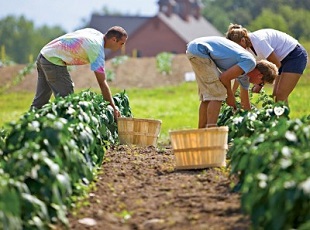Why Study this Commercial Organic Vegetable Growing Course?
If you want to produce organic vegetable commercially, this course may be the one you are looking for! This online commercial organic vegetable growing course will help you develop knowledge on cultivating and planting, properties of soil and the techniques to manage it, the different major varieties of vegetables, the methods to control pests and diseases, greenhouse production, and the role of irrigation in commercial organic vegetable production.
Commercial Organic Vegetable Growing Course Online
Learn the processes required to tap into the commercial organic vegetable marke
- Learn all aspects of organic vegetable production.
- 100 hour self paced course
- Study in your own time at your own pace.
- Study with our tutors who are experts in the field.
Course Aims
- Discuss general horticulture and plant taxonomy principles
- Describe a range of cultivation and planting techniques
- Explain soil properties, and their relationship to organic plant production
- Diagnose basic soil nutrient deficiencies
- Discus major and minor commercial vegetable varieties
- Describe a variety of pest and disease management principles
- Explain the use of seed in commercial organic agriculture, including storage, viability, germination, genetic purity, and hybridisation
- Discuss the principles of greenhouse growing
- Describe a variety of irrigation methods suitable for organic vegetable production
- Explain organic weed control methods
- Explain issues relating to harvesting and marketing of vegetables
Course Outline
There are 12 lessons in this course:
- Introduction
- Organic Growing and it’s definitions
- Influential people in the organic movement
- Different ways to grow -permaculture, biodynamics, etc.
- Organic certification
- Transition to organic production
- Management Plan
- Industry awareness
- Resources and Networking
- Understanding Plant Names
- Cultivation and Planting
- Cultivation methods
- Crop rotation
- Green manures
- No dig growing
- Planting
- Sowing vegetable seed outside
- Germinating indoors
- Transplanting seedlings
- Crowns, offsets, tubers
- Crop scheduling
- Tillage, Ripping, Harrowing, Dis ploughing, etc
- Tractors
- Soils and Nutrition
- Physical soil properties -profile, texture, etc
- Chemical properties -pH, cation exchange capacity, buffering etc.
- Soil water, air, temperature
- Humus and Organic matter
- Nutrient elements
- Organic Fertilizers
- Animal manure
- Liquid feeds in an organic system
- Rock dusts
- Diagnosing nutritional problems
- Soil Management
- Importance of soil
- Cultivation techniques
- Cover crops
- Green manures
- Nitrogen fixation
- Rhizobium bacteria
- Mycorrhizae
- Composting
- Hot heaps vs cold
- Review of Major Vegetable Varieties
- Getting the best from an organic vegetable plot
- Vegetable Directory -Beans, Beetroot, Broccoli, Sprouts, Cabbacge, Capsicum, Carrot, Cauliflower, Corn, Celery, Eggplant. Lettuce, Onion, Pak Choi, Parsnip, Pea, Potato, Pumpkin, Marrow, Squash, Radish, Spinich Turnip
- Transplanting Guide
- Pests and Disease
- Integrated Pest Management
- Allowable Inputs
- Understanding Pest and Disease
- Understanding Other Plant Problems
- Lifecycles
- Review of common problems
- Companion Planting
- Seed
- Organic seed
- Seed production -preventing cross pollination
- Choosing seed plants for vegetable crops
- Collecting seeds
- Cleaning and storing seed
- Seed germination
- Greenhouse Growing
- Types of greenhouses
- Framing and covering materials
- What greenhouse is appropriate
- Siting a greenhouse
- Benching
- Greenhouse hygiene
- Problems with greenhouses
- Other structures -cold frames, shade houses
- Environmental controls
- Heating, Cooling
- Controlling light
- Growing media
- Fertigation in organic systems
- Carbon dioxide enrichment
- Irrigation Methods
- Crops Directory -Tomatoes, Cucumber, Melons, Zucchini
- Lesser Grown Varieties and Herbs
- Growing herbs
- Review of many culinary herbs-Alliums, Corriander, Mints, Basil, Oregano, Rosemary, Pasley, Savory, Thyme, etc.
- Review of lesser grown vegetables -Amaranth, Artichoke, Asparagus, Cassava, Chicory, Dandelion, Garlic, Endive, Ginger, Horseradish, Chicory, Mint, Leek, Okra, Pigface, Rhubarb, Sweet Potato, Warrigul Greens, Taro, Yams, etc
- Irrigation
- Irrigation objectives and feasibility
- Soil and water
- Understanding classes of soil moisture
- Soil and transpiration
- Field capacity
- Permenant Wilting point
- Tensiometers
- When to irrigate
- Scheduling irrigation
- When to irrigate
- Cyclic watering
- Pulse watering
- Plant root depth
- Irrigation type -flood, sprinkler, ytickle etc.
- Portable, permenant or travelling sprinklers
- Sprinklet spacings
- Mulching and Weeds
- Understanding mulch
- Types of mulch materials
- Rules for using mulch
- Living mulch
- Weed Management
- Preventing weeds
- Harvesting and Marketing
- Harvesting techniques
- PostHarvest quality considerations
- Harvesting hints
- Post harvest treatment of vegetables -field processing
- Cooling
- Quality standards
- Monitoring and reviewing
- Marketing
- Business capabilities
- Market research
- Target marketing
- Understanging economics
Enrol Now
- Experienced Tutor support
- Certificate sent to you
- Online study (Printed notes available)
- Self paced - no set timetable
- 12 months to complete course
From: $35.00 / week for 19 weeks
Get a Free Info Pack!











